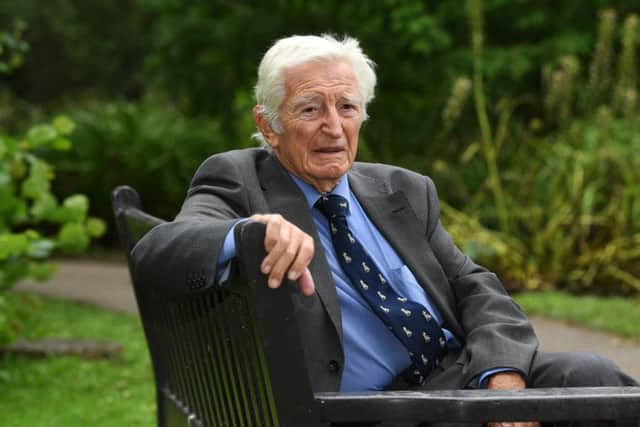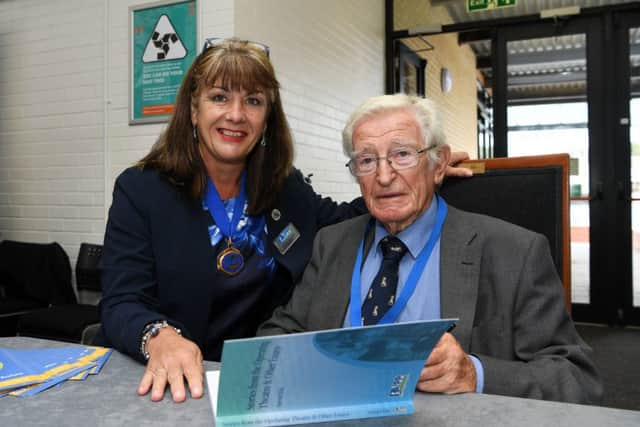Meet the 93-year-old superstar of surgery whose career started in same month as NHS


When Professor Harold Ellis reflects on the extraordinary advances in healthcare he has witnessed over the course of 71-year – and counting – career in medicine, he says his own story perfectly exemplifies how things have changed.
“When I was a young surgeon, we would be told that once a patient is 65 they are not worth operating on,” he says, speaking over the phone from his home in London a few days before coming up to Yorkshire to launch his latest book. “Now I am 93 and still working. In a past generation, statistically I should have been dead about 25 years ago. It used to be that someone of 75 was seen as an old man – nowadays people of that age are running marathons.”
Advertisement
Hide AdAdvertisement
Hide AdBut Professor Ellis, whose career began in July 1948, the very same month that the National Health Service came into being, says the positive changes have had consequences that were not anticipated by its founders after being established by Health Minister Aneurin Bevan following the inter-war Beveridge Report on reducing poverty by Sir William Beveridge.


“The health service is a wonderful thing and I am a great believer in it but I think as each year passes it is going to cost more,” says Ellis. “Beveridge said if you give people medical care and look after them, they will become healthier. But they don’t - they get older and iller and require lots of money to lot after them.”
He says finding the answers for the NHS is down to politicians rather than people like himself but puts the calculation facing them in unflinching terms. “We have just got to realise either we are going to let people die or suffer or we are going to have to just pour money into it.”
Advertisement
Hide AdAdvertisement
Hide AdEllis is one of the most notable British surgeons of the 20th Century and has inspired generations of other doctors after lecturing in surgery and then clinical anatomy - a job he continues to do to this day at King’s College London.
The extent of his success in his field is highlighted by an extraordinary CV that has seen Ellis serve as a Vice President of the Royal College of Surgeons and of the Royal Society of Medicine and a past president of the British Association of Surgical Oncology, as well as being the author of the influential student textbook Clinical Anatomy and having respected surgery awards named after him.
Advertisement
Hide AdAdvertisement
Hide AdHis latest book was launched at a special event at York University on Saturday. Stories from the Operating Theatre and Other Essays is based on monthly columns he has written for the Journal of Perioperative Practice and explores some of the most significant moments in medical history, from Horatio Nelson’s amputation, through to the introduction of anaesthesia and Marie Curie’s discovery of radium.
But his latest visit to Yorkshire as an eminent and internationally-respected surgeon promoting his 25th published book comes in rather different circumstances to when he arrived to work in the region in 1953 as the resident surgical officer at Sheffield Royal Infirmary.
Ellis says that while he had “two glorious years” in Yorkshire, as a Londoner he initially struggled to understand what local patients were trying to tell him. He says that after travelling up to Sheffield and introducing himself as the new surgical officer, he was told he was immediately wanted on Ward Six. “I put my case down, went up there and there was a patient in Bed Eight, a little old retired coal miner. I said in my best London accent, ‘What’s the trouble?’ He said ‘Me guts’,” says Ellis in a pitch-perfect impression of a South Yorkshire accent.
He says after being told in rather blunt language that the problem was that the man’s guts weren’t working properly, he operated on two foot of them. “I couldn’t understand what people were saying but within two weeks, I could speak fluent Sheffield. I was quite sorry to become a Cockney again when I left.”
Advertisement
Hide AdAdvertisement
Hide AdEllis says working in the fledgling health service in the 1940s and 1950s during times of “very exciting change” in medicine was a privilege - particularly in seeing first-hand how penicillin and other antibiotics were able to treat previously-fatal illnesses.
“During the war, penicillin was reserved for the armed forces. All of a sudden it became available to us; this wonder drug came in and within days these terrible infections that were killing people before were being cured,” he says. “It was absolutely marvellous and very exciting. We were all scared of getting TB but being born and bred in the East End, I thought I was inoculated. Patients who previously would have spent two, three or four years in a sanatorium and perhaps dying at the end were getting cured.”
Being a medical professional in those days was not without its risks and Ellis says he was particularly fearful of polio having known colleagues contract it and need to use the infamous iron lung mechanical respirators to stay alive. While the first effective vaccines were developed in the early 1950s, as late as 1961 there were 79 deaths and more than 700 acute cases in the UK from polio. “Polio was a terrible disease, the one thing I was scared of,” says Ellis. “A lot of men died in the iron lung after catching it from a patient. So when it came in I was the first in the queue for a polio vaccine.”
The disease has not been recorded in the UK since the 1980s and Ellis says its effective eradication is just one of a series of positive medical advances that have occurred over the course of his career.
Advertisement
Hide AdAdvertisement
Hide AdOne chapter of his new book is on the previously-standard operations which have now been discarded by the NHS thanks to medical advances. “A peptic ulcer was extremely common. You would have a hospital full of patients where we were doing radical removals of the stomach for it. It was major, major surgery with complications and mortality risks. But you had to do it. Nowadays you are given a few antibiotics.”
He says that some of the biggest strides have been made in the field of breast cancer. After conducting hundreds of radical mastectomies in his career involving the extensive removal of breast, underlying chest muscle and lymph nodes, Ellis says medical advances mean such surgery is now much less invasive than in the past.
He jokingly says his reason for continuing to work into his 90s is not entirely his decision. “My wife won’t let me in the house during the day, she needs me out in the morning!”
But when asked if he can pick out any particular highlights from a medical career that began just after the Second World War, his passion for his field - and the pleasure he has taken from it - shines through.
Advertisement
Hide AdAdvertisement
Hide Ad“I have enjoyed it all. I used to go into hospital every day hugging myself with delight. I would go into the operating theatre and say ‘what have we got today?’
“It was all great fun.”
Arrival of NHS ‘went under the radar’
Professor Ellis says when the NHS came into being in 1948, patients and staff initially noticed little difference as they were used to nationalised hospitals as a result of the Second World War.
We didn’t notice that the NHS had come in - nurses weren’t wearing badges and there were no big banners outside the hospitals,” he recalls.
“The patients and staff didn’t notice any difference.
“For the ordinary hospital staff, everything went on absolutely as normal.”
But he adds one area where there was a change was his pay packet as his salary doubled from £1 to £2 per week.
“It was a lot of money in those days.”